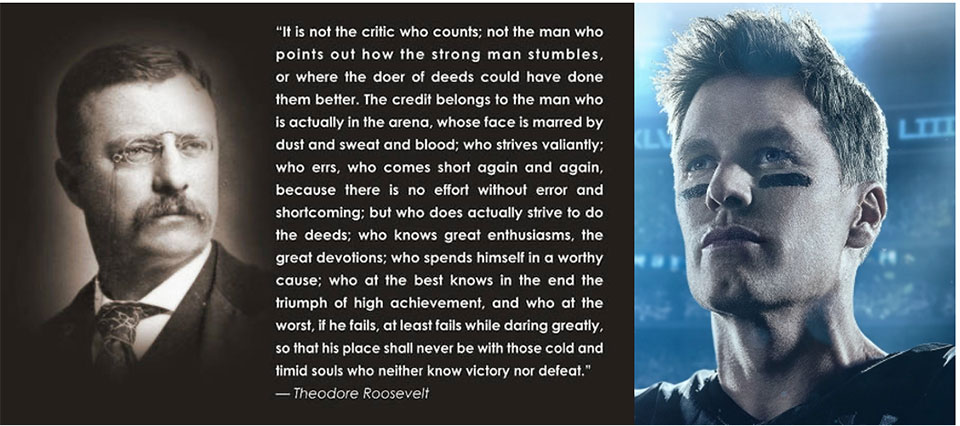Prevailing in the Arena

More than 100 years ago, Teddy Roosevelt delivered a speech at Le Sorbonne, University of Paris, titled Citizenship in a Republic, popularly known for its passage “the man in the arena.” Future Hall of Fame quarterback Tom Brady saw this quote every day in the locker room during his time at the University of Michigan. It fittingly serves as the title of his new documentary series on ESPN+. The passage reads as follows:
“It is not the critic who counts; not the man who points out how the strong man stumbles, or where the doer of deeds could have done them better. The credit belongs to the man who is actually in the arena, whose face is marred by dust and sweat and blood; who strives valiantly; who errs, who comes short again and again, because there is no effort without error and shortcoming; but who does actually strive to do the deeds; who knows great enthusiasms, the great devotions; who spends himself in a worthy cause; who at the best knows in the end the triumph of high achievement, and who at the worst, if he fails, at least fails while daring greatly, so that his place shall never be with those cold and timid souls who neither know victory nor defeat.”
As forceful as this passage reads by itself, it sings louder in the context of the entire speech – one that warns us against cynicism and speaks to the importance of an individual’s commitment to the team. Whether it involves the fate of the republic, the success of a football franchise, or the future of our organizations, the power of we begins with each of us.
No Place for Cynicism
Before uttering his famous passage, Roosevelt warned us about the cynics: “There are many men who feel a kind of twister pride in cynicism; there are many who confine themselves to criticism of the way others do what they themselves dare not even attempt. There is no more unhealthy being, no man less worthy of respect, than he who either really holds, or feigns to hold, an attitude of sneering disbelief toward all that is great and lofty, whether in achievement or in that noble effort which, even if it fails, comes to second achievement.”
At the start of the 2002 Super Bowl, when America and the world were still reeling from the 9/11 attacks, the Patriots chose to be introduced as a team – one team, one nation. Throughout the season, they won and lost together. No finger-pointing. No blame culture. It was a team committed to learning, stumbling, getting up, and growing every day. Great teams don’t regard winning the championships as the goal; they see it as the reward for a daily commitment to setting their own standard of excellence. The Patriots are about the process and, as a result, have won six Super Bowls.
A Commitment to One Another
Later in the speech, Roosevelt stated: “Individual initiative, so far from being discouraged, should be stimulated; and yet we should remember that, as society develops and grows more complex, we continually find that things which once it was desirable to leave to individual initiative can, under changed conditions, be performed with better results by common effort.”
Tom Brady speaks to the team culture of the New England Patriots, where the players did whatever it took to make them more vital individual contributors to the collective. Their commitment to one another (including each other’s families) helped them maximize their potential as a team in a game where the difference between winning and losing can be measured in inches. Hard work and relentless attention to detail won the day and earned them championships. Brady and Coach Bill Belichick would be the first to tell you that no individual player or coach was responsible for creating their winning culture. Instead, it took everyone willing to step into the arena to give everything they had for the team.
Gratitude
As we emerge from the Thanksgiving holiday here in the US, with gratitude in our hearts, we might take a moment to remind ourselves of what it takes to build and sustain a great nation, a winning culture, and a successful, sustainable organization. At its epicenter is a culture committed to learning, stumbling, getting up, and growing every day.
The strength of such a culture is a byproduct of our commitment to one another toward a shared purpose. It’s about being in the arena, not criticizing others from the cheap seats – no cynics allowed. The term Peernovation combines the words peer (people like me) and innovation (creativity realized). Peernovation occurs when a carefully selected, diverse collection of people with a common purpose and shared values work together to make each other better and create something larger than themselves. It’s also what makes us agile and adaptable enough to handle whatever the outside world throws in our direction.
The power of we begins with each of us. To prevail, it will take all of us.
Written by Leo Bottary.
Bring the best of the CEOWORLD magazine's global journalism to audiences in the United States and around the world. - Add CEOWORLD magazine to your Google News feed.
Follow CEOWORLD magazine headlines on: Google News, LinkedIn, Twitter, and Facebook.
Copyright 2025 The CEOWORLD magazine. All rights reserved. This material (and any extract from it) must not be copied, redistributed or placed on any website, without CEOWORLD magazine' prior written consent. For media queries, please contact: info@ceoworld.biz








